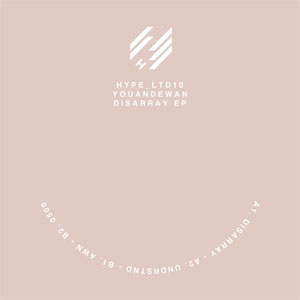Youandewan Disarray EP
From across the Atlantic, it has at times been frustratingly difficult to keep up with […]

From across the Atlantic, it has at times been frustratingly difficult to keep up with Leeds producer/DJ Youandewan. His initial Burial-leaning releases piqued some interest from our side of the pond, but after that, the Brit could seemingly only be found undertaking random remix duties or appearing on the occasional compilation. Fortunately, Youandewan’s first proper release in quite some time presents a solid four tracks that refit the mood and lush space of his earlier, post-dubstep-aligned material into deep and subtle house music.
In truth, Disarray has little in the way of surprises. Its four tracks utilize the same core elements: contemplative chords, tasteful R&B vocal chops, minimal drum programming, and sub-basslines that playfully roll around the four-on-the-floor kicks and up-swung hats. Furthermore, each song comes with the same airy touch—the claps, snaps, and cymbals sizzle in the high end while the floaty pads and bluesy chords are left with plenty of room to breathe, particularly when they’re passed through dubbed-out delays and understated reverbs. In a word, this EP is simple. Youandewan does not dress up his handful of chosen elements with more than a bit of time-based processing, and across these (mostly) elongated track lengths, the pieces are allowed to evolve at a calm pace. The simplicity and efficiency of these productions is what makes Disarray such a strong effort though; listeners are not made to wait in anticipation for a drop or lead section to arrive; instead, they are gradually immersed into Youandewan’s dense house constructions and are given plenty of time to explore before being released back into the real world.
Given Disarray‘s cohesiveness, it’s hard to pinpoint a particular highlight. The opening title track is likely an intro of sorts—clocking in three minutes shorter than any other of the EP’s tunes—and the closing “0500” moves with even less urgency than its counterparts, although it’s certainly never boring. This leaves “AWN” and “Undrstnd” as perhaps the most dancefloor-appropriate cuts. Both share small snippets of familiar female vocals and, despite taking their time, eventually lay into some potent dancefloor grooves—albeit ones that are a bit reserved when compared to much of the current crop of house music.
In the end, Disarray is a welcome reminder that bass weight and bombast are not the only tools available to producers who exist within the UK house and bass-music spheres. Sometimes, we’d rather be coyly beckoned to the floor by subtle shifts and pristine craftsmanship than hit over the head with larger-than-life percussion rolls and two-dimensional chord progressions. Fortunately, Youandewan has us covered for now.

